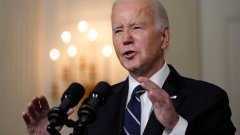
North Carolina Republican lawmakers voted to override the Democratic governor's vetoes on on Tuesday, giving themselves new power over election administration and shortening a key voting deadline ahead of the 2024 election.
North Carolina Gov. Roy Cooper vetoed the bills earlier this year, saying in a statement that they make it , but Republicans have a supermajority in the legislature and voted to override his vetoes.
The bills promise to affect the swing state's presidential election next year, though litigation is expected and could delay or block the implementation of challenged provisions.
In interviews , advocates said they were most concerned about Senate Bill 749, which will rework the composition of state and local election boards, the five-person bodies that oversee democratic operations and certify election results.
County boards register voters, operate polling sites, and count ballots, while the state board appoints individuals to and oversees those local boards. Currently, all election boards in the state are controlled by the governor's party, with nominations made by state parties and appointments made by the governor.
The legislation removes the governor from the process completely, creating state and local boards that are evenly divided between the two parties and comprised of members appointed by state legislative leaders.
Republican supporters of the legislation say it takes the politics out of election administration, but experts say it could result in a nightmare scenario of deadlocked election boards unable to complete the basic tasks of election administration.
In certain scenarios, a deadlocked board could send the decision back to the legislature, but the bill largely does not address what would happen if election boards can't agree on administration or certification of results.
Read more on NBC News
"The legislative takeover of state and local elections boards could doom our state's elections to gridlock and severely limit early voting," Cooper when he vetoed the bill. "It also creates a grave risk that Republican legislators or courts would be empowered to change the results of an election if they don't like the winner. That's a serious threat to our democracy."
Advocates and Democrats in particular fear the bill's effect on early voting. If county or state election boards do not approve early voting sites and schedules in accordance with state law, early voting can only take place at the county board of elections office. In populous counties, that could leave hundreds of thousands of voters with just one early voting option.
A second bill, Senate Bill 747, adds a spate of new restrictions to voting in the state, including banning drop boxes and most private funding.
It also shortens the deadline for mail ballots to be received by election officials by three days.
"If this rule had been implemented in 2020, it would have led to 11,000 votes being tossed, so especially going into a presidential election, it's no small thing," said Megan Bellamy, a vice president at the Voting Rights Lab, a nonpartisan group that tracks election legislation.



